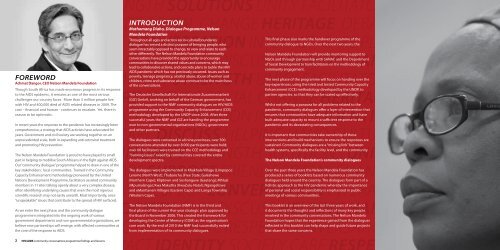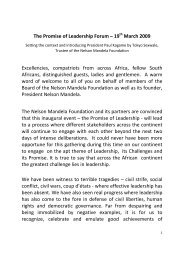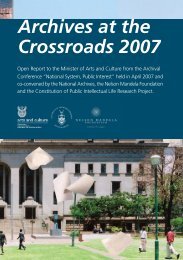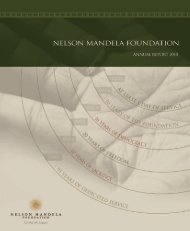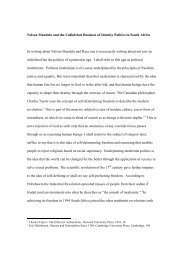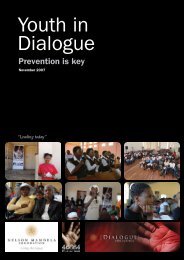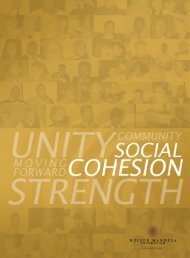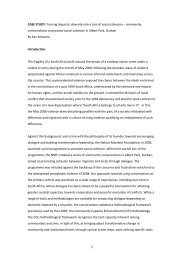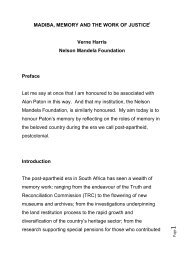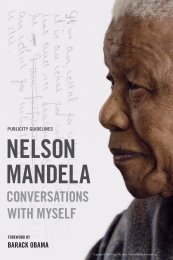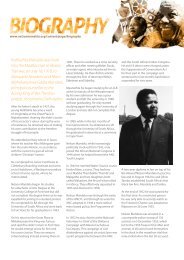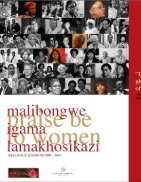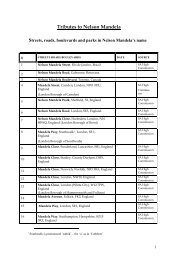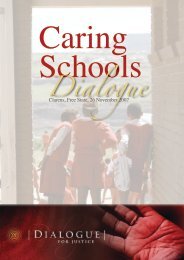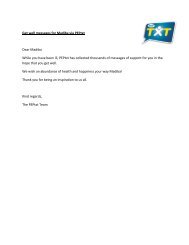Community dialogues - Nelson Mandela Foundation
Community dialogues - Nelson Mandela Foundation
Community dialogues - Nelson Mandela Foundation
You also want an ePaper? Increase the reach of your titles
YUMPU automatically turns print PDFs into web optimized ePapers that Google loves.
ForewordAchmat Dangor, CEO <strong>Nelson</strong> <strong>Mandela</strong> <strong>Foundation</strong>Though South Africa has made enormous progress in its responseto the AIDS epidemic, it remains as one of the most seriouschallenges our country faces. More than 5 million people livewith HIV and 400,000 died of AIDS related diseases in 2009. Thecost – financial and human - continues to escalate. Yet, there isreason to be optimistic.In recent years the response to the pandemic has increasingly beencomprehensive, a strategy that AIDS activists have advocated foryears. Government and civil society are working together on anunprecedented scale, both in expanding anti-retroviral treatmentand promoting HIV prevention.The <strong>Nelson</strong> <strong>Mandela</strong> <strong>Foundation</strong> is proud to have played its smallpart in helping to mobilise South Africans in the fight against AIDS.Our “community dialogue” programme helped to draw in one of thekey stakeholders: local communities. Trained in the <strong>Community</strong>Capacity Enhancement methodology pioneered by the UnitedNations Development Programme, facilitators assisted communitymembers in 11 sites talking openly about a very complex disease,often identifying underlying causes that even the most rigorousscientific research may not easily unearth. Most importantly, once“unspeakable” issues that contribute to the spread of HIV surfaced.As we enter the next phase, and the community dialogueprogramme is integrated into the ongoing work of variousgovernment departments and non-governmental organisations, webelieve new partnerships will emerge, with affected communities atthe core of the response to AIDS.introductionMothomang Diaho, Dialogue Programme, <strong>Nelson</strong><strong>Mandela</strong> <strong>Foundation</strong>Throughout all ages and across socio-cultural boundariesdialogue has served a distinct purpose of bringing people, whoseem intractably opposed to change, to view and relate to eachother differently. The <strong>Nelson</strong> <strong>Mandela</strong> <strong>Foundation</strong> communityconversations have provided the opportunity to encouragecommunities to discover shared values and concerns, which maylead to collaborative actions, and concrete plans to tackle the HIV/AIDS pandemic which has not previously occurred. Issues such aspoverty, teenage pregnancy, alcohol abuse, abuse of women andchildren, crime and substance abuse continue to be the main focusof the conversations.The Deutsche Gesellschaft für Internationale Zusammenarbeit(GIZ) GmbH, working on behalf of the German government, hasprovided support to the NMF community <strong>dialogues</strong> on HIV/AIDSprogramme using the <strong>Community</strong> Capacity Enhancement (CCE)methodology developed by the UNDP since 2008. After threesuccessful years the NMF and GIZ are handing the programmeover to non-governmental organisations (NGOs), governmentand other partners.The <strong>dialogues</strong> were convened in all nine provinces, over 300conversations attended by over 8 000 participants were held;over 60 facilitators were trained on the CCE methodology and“burning issues” raised by communities covered the entiredevelopment spectra.The <strong>dialogues</strong> were implemented in Khakhala Village (Limpopo);Lerome (North West); Thabanchu (Free State; Galeshewe(Northern Cape); Kliptown and Soshanguve (Gauteng); Mhluzi(Mpumalanga); Kwa Makutha (KwaZulu-Natal); Ngangelizweand eMantlaneni Villages (Eastern Cape) and Langa Township(Western Cape).The <strong>Nelson</strong> <strong>Mandela</strong> <strong>Foundation</strong> (NMF) is in the third andfinal phase of the current five-year strategic plan approved bythe Board in November 2006. This created the framework fordeveloping the Centre of Memory (COM) as the organisation’score work. By the end of 2010 the NMF had successfully exitedfrom implementation of its community <strong>dialogues</strong>.This final phase also marks the handover programme of thecommunity dialogue to NGOs. Over the next two years, the<strong>Nelson</strong> <strong>Mandela</strong> <strong>Foundation</strong> will provide mentoring support toNGOs and through partnership with SANAC and the Departmentof Social Development to train facilitators on the methodology ofcommunity engagement.The next phase of the programme will focus on handing over thekey experiences, using the tried and tested <strong>Community</strong> CapacityEnhancement (CCE) methodology developed by the UNDP, topartner agencies, so that they can be scaled up effectively.Whilst not offering a panacea for all problems related to thepandemic, community <strong>dialogues</strong> offer a layer of intervention thatensures that communities have adequate information and havebuilt adequate capacity to mount a sufficient response to thepandemic and its devastating consequences.It is important that communities take ownership of theseinterventions and build mechanisms to ensure the responses aresustained. <strong>Community</strong> <strong>dialogues</strong> are a “missing link” betweenhealth systems, specifically the facility level, and the community.The <strong>Nelson</strong> <strong>Mandela</strong> <strong>Foundation</strong>’s community <strong>dialogues</strong>Over the past three years the <strong>Nelson</strong> <strong>Mandela</strong> <strong>Foundation</strong> hasproduced a series of booklets based on numerous community<strong>dialogues</strong> held around the country. The <strong>dialogues</strong> form part of aholistic approach to the HIV pandemic whereby the importanceof personal and social responsibility is emphasised in publicmeetings of various communities.This booklet is an overview of the last three years of work, andit documents the thoughts and reflections of many key peopleinvolved in the community conversations. The <strong>Nelson</strong> <strong>Mandela</strong><strong>Foundation</strong> hopes that the experience gained from the <strong>dialogues</strong>reflected in this booklet can help shape and guide future projectsthat share the same concerns.2 HIV/AIDS community conversations programme findings and lessons


